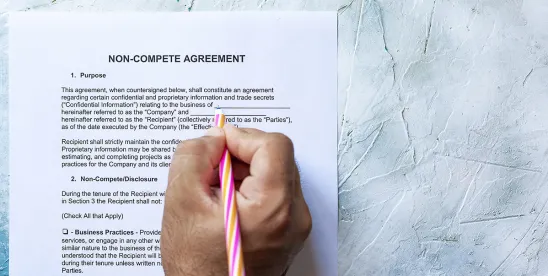Highlights
- A Texas federal judge issued a nationwide injunction in late August preventing the FTC from enforcing its new rule against non-compete agreements
- While the FTC has accepted the ruling and is considering an appeal, employers do not need to send out the notice identified in the FTC’s rule
- States will continue limiting the use of restrictive covenants and employers should audit their agreements to ensure they comply with ever-changing regulations
On Aug. 20, a Texas federal judge issued a nationwide injunction preventing the Federal Trade Commission (FTC) from enforcing its new rule banning non-competes, which was set to go into effect on Sept. 4, 2024.
On April 23, 2024, the FTC approved a new rule banning non-compete agreements. The FTC’s rule sought not only to prohibit almost all non-competes, but also require employers to notify all current and former workers subject to a non-compete that their non-compete is no longer enforceable.
Litigation on the FTC’s Non-Compete Rule
In Ryan LLC v. FTC, tax company Ryan LLC, along with the U.S. Chamber of Commerce, argued the FTC’s ban surpassed its authority. In early July, U.S. District Judge Ada E. Brown agreed and issued a preliminary injunction preventing enforcement of the rule, but the court limited the decision to the plaintiffs in that case until it reached a final decision.
On Aug. 20, that final decision was released. In concluding the rule exceeded the FTC’s authority and was arbitrary and capricious, Judge Brown held the rule should be set aside and shall not be enforced nationwide. The U.S. Chamber of Commerce called the ruling a significant win in its “fight against government micromanagement of business decisions.”
This decision, however, comes on the heels of a decision in a Pennsylvania federal court in late July. There, U.S. District Judge Kelley Brisbon Hodge refused to grant a preliminary injunction against the non-compete ban. In support, Judge Hodge said, “[t]he FTC's final rule serves to …. prevent unfair methods of competition in the form of non-compete agreements, both before they occur as well as after, to cease the past and ongoing harm they inflict as illustrated in the FTC's final rule.” The parties are currently briefing dispositive motions.
Now What?
As an immediate matter, employers do not need to send out notices to current and former employees that their non-competes are invalid. Given the uncertainty, employers should be cautiously optimistic about Ryan’s holding.
Longer term, how must businesses move forward considering the conflicting opinions in courts in the Third and Fifth Circuits? The FTC’s website acknowledges that a district court’s order has stopped the FTC from enforcing the rule, but it is considering an appeal. Assuming there is an appeal, it is possible the issue will reach the U.S. Supreme Court.
The FTC has made it clear that it will still fight non-competes through individual cases. Historically, these individual cases have targeted specific antitrust concerns, often contained in franchisee agreements.
While the FTC’s rule was prevented, states are increasingly regulating and limiting the enforceability of non-competes and other restrictive covenants. Employers would be wise to audit their restrictive covenants and revise them as necessary for enforcement under state law, and ensure that they have other measures in place for protectable business interests, such as trade secrets.




 />i
/>i


